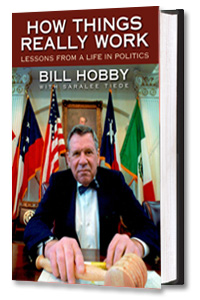Whatever television touches it destroys–the President, the Congress and now the courts, author and journalist Richard Reeves remarked recently after a lecture at the Lyndon B. Johnson School of Public Affairs.
He was referring, of course, to the national addiction, the O.J. Simpson trial. Pundits and newspaper editorials deride it as an “offensive sideshow”. University of Texas Law Professor Michael E. Tigar compares it to “a pillow fight in a pizza parlor” People say they’re sick and tired of it, but CNN’s ratings are off the chart.
A recent seminar at the University of Texas School of Law focused on the impact of mass media on litigation. The judicial process has always carried a heavy burden: to discover the truth, protect the rights of the accused and punish the guilty. Does the media’s spotlight make that mission impossible?
Our democracy leaves us with relatively few tools to curb the excesses of the tabloids. In Britain, judges can hold the media in contempt. Not here. An attorney who runs his mouth can be censured by the local bar association. But censure collides frequently with protected rights of free speech.
One of the participants in the seminar was Dominic Gentile, a Las Vegas, Nev., attorney who was disciplined by the Nevada State Bar for a pre-trial press conference. Gentile was defending the owner of a storage company accused of stealing money and drugs stored there in a police sting operation. In his press conference, Gentile noted that police officers were likely suspects in the crime.
“There had been 13 months of pre-trial publicity. This was my first chance to respond,” Gentile said, adding that prosecutors used the media to demoralize the accused.
His press conference won him a private reprimand from the State Bar. He appealed. Tigar argued for him before the U.S. Supreme Court and the court found that the bar canon was unconstitutionally vague.
The Nevada Bar is looking for new language which would forbid pretrial statements that prejudice a jury. The problem, according to Gentile, is that there must be clear and convincing evidence that the statement will prejudice the jury. This evidence comes not from the law, but from market studies and sociological research–very hard to prove.
Judges have some weapons to protect the right to a fair trial. They can change venue–move the trial to another city. They can decide against having cameras in the courtroom. They can put gag orders on attorneys. They can sequester the jury.
But mainly it’s friendly persuasion, said Judge John F. Onion. Most people don’t want to displease the judge.
As presiding judge of the Court of Criminal Appeals for many years and visiting judge in last year’s aborted trial of Sen. Kay Bailey Hutchison, Onion has had plenty of experience with media. His main concern is that preoccupation with media problems can distract judges from the law.
Exasperated with media though they might be, the attorneys and judges were more afraid of heavy-handed restrictions on courtroom coverage.
The bottom line is a fair trial, said William Cofer, a Kansas City, Mo., defense attorney. An open press assures public faith in the judicial process. By and large, he said, it’s better to have controversies in public.
And they confessed that the media had served them and their clients well on occasion. Here are a few of their hints for maximum media manipulation.
Rule 1: Media attention does not do the defendant a whole lot of good.
Remember former Secretary of Labor Ray Donovan on the courthouse steps the day of his acquittal. He said, “Where do I go to get my reputation back.”
Rule 2: Know your objective and stick to it.
William H. Colby of Kansas City, Mo., represented Nancy Cruzan and later Christine Busalacchi in the “right to die” cases. Nancy Cruzan was on life support after a car accident. Her family, believing that it was the correct thing to do and what she would have wanted, wanted to stop medical treatment. They were opposed by the state of Missouri.
“We courted public coverage because we wanted to raise the level of human consciousness about this issue,” Colby said. “I said the same thing over and over….that such a private decision should not be interfered with by the state. Ultimately that became the way we deal with this issue.”
Rule 3: A closed mouth gathers no foot.
Lawyers love to see their names in the paper. The important thing to remember is whether talking to a reporter will help your client. If the answer is no, don’t.
Rule 4: Never lie, never dissemble.
They will find out. They will be furious. Remember Nixon.

